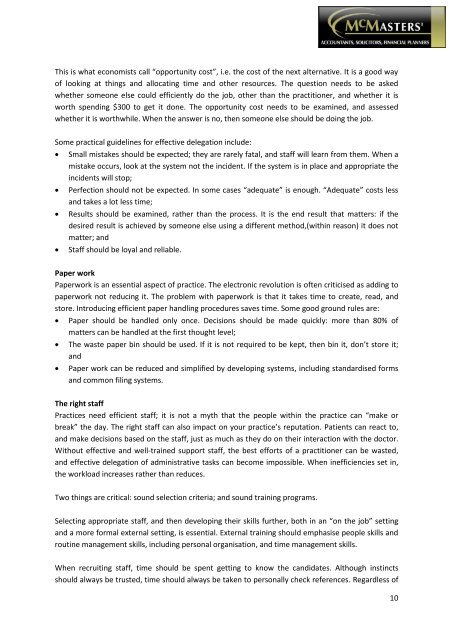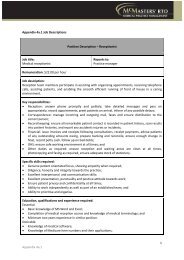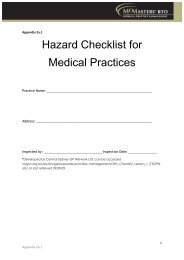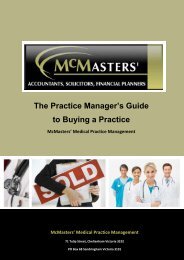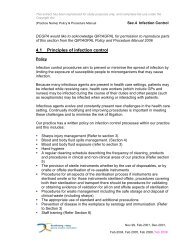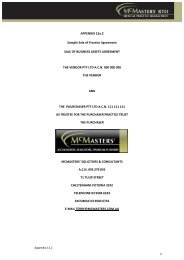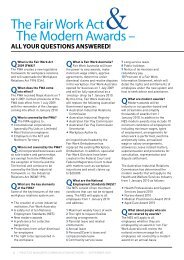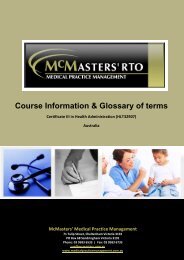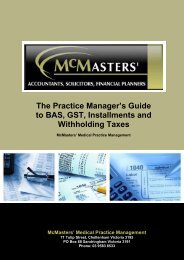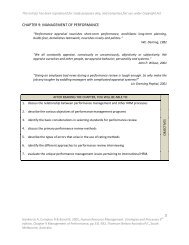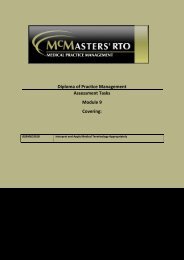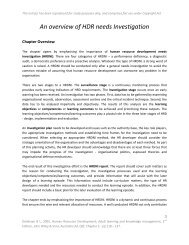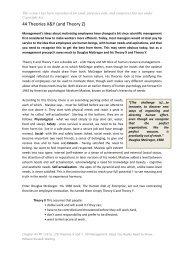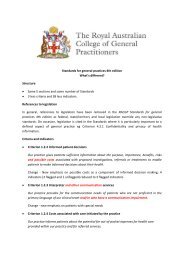This is what economists call “opportunity cost”, i.e. the cost of the next alternative. It is a good wayof looking at things and allocating time and other resources. <strong>The</strong> question needs <strong>to</strong> be askedwhether someone else could efficiently do the job, other than the practitioner, and whether it isworth spending $300 <strong>to</strong> get it done. <strong>The</strong> opportunity cost needs <strong>to</strong> be examined, and assessedwhether it is worthwhile. When the answer is no, then someone else should be doing the job.Some practical guidelines for effective delegation include:Small mistakes should be expected; they are rarely fatal, and staff will learn from them. When amistake occurs, look at the system not the incident. If the system is in place and appropriate theincidents will s<strong>to</strong>p;Perfection should not be expected. In some cases “adequate” is enough. “Adequate” costs lessand takes a lot less time;Results should be examined, rather than the process. It is the end result that matters: if thedesired result is achieved by someone else using a different method,(within reason) it does notmatter; andStaff should be loyal and reliable.Paper workPaperwork is an essential aspect of practice. <strong>The</strong> electronic revolution is often criticised as adding <strong>to</strong>paperwork not reducing it. <strong>The</strong> problem with paperwork is that it takes time <strong>to</strong> create, read, ands<strong>to</strong>re. Introducing efficient paper handling procedures saves time. Some good ground rules are:Paper should be handled only once. Decisions should be made quickly: more than 80% ofmatters can be handled at the first thought level;<strong>The</strong> waste paper bin should be used. If it is not required <strong>to</strong> be kept, then bin it, don’t s<strong>to</strong>re it;andPaper work can be reduced and simplified by developing systems, including standardised formsand common filing systems.<strong>The</strong> right staff<strong>Practice</strong>s need efficient staff; it is not a myth that the people within the practice can “make orbreak” the day. <strong>The</strong> right staff can also impact on your practice’s reputation. Patients can react <strong>to</strong>,and make decisions based on the staff, just as much as they do on their interaction with the doc<strong>to</strong>r.Without effective and well-trained support staff, the best efforts of a practitioner can be wasted,and effective delegation of administrative tasks can become impossible. When inefficiencies set in,the workload increases rather than reduces.Two things are critical: sound selection criteria; and sound training programs.Selecting appropriate staff, and then developing their skills further, both in an “on the job” settingand a more formal external setting, is essential. External training should emphasise people skills androutine management skills, including personal organisation, and time management skills.When recruiting staff, time should be spent getting <strong>to</strong> know the candidates. Although instinctsshould always be trusted, time should always be taken <strong>to</strong> personally check references. Regardless of10
how impressive a new recruit may appear, it wise always <strong>to</strong> implement 3 months probation asstandard; as this allows many decisions that may have “seemed like a good idea at the time” <strong>to</strong> bereversed.Investing time and effort in your staff has the benefit of a better-trained, and a more knowledgeableteam, with a correlating high productivity. It also sends the message that the practice values its staff,and this in itself can help produce excellent results through supporting a motivated team.Self disciplineAs a discipline, medical doc<strong>to</strong>rs are generally known for their organisational skills. Vigilance and aregular return <strong>to</strong> basics helps maintain high standards of self-discipline that convert <strong>to</strong> better timemanagement and personal productivity.Self discipline can be improved fundamentally, by setting goals. <strong>The</strong>se should be for the long term,the short term and the immediate. <strong>The</strong> degree of precision and detail is greater with a shorter timeperiod. Committing goals <strong>to</strong> paper and constantly refreshing your memory and consciousness ofthem, creates focus and facilitates achievement. This process should be systemised: a few minutesplanning each morning and a brief review each evening, <strong>to</strong> a more formal process for long termgoals. It is difficult <strong>to</strong> achieve goals if the goals have not been identified. <strong>The</strong> title of Wayne Dwyer’sbook “You will see it when you believe it” speaks volumes: the mere act of putting pen <strong>to</strong> paper canfacilitate achievement by channelling attention <strong>to</strong> the tasks that most require it.This task could be as simple as writing a “<strong>to</strong> do” list, or as complex as a large scale business plan.Goals should reflect priorities, and should distinguish between important tasks and urgent tasks. <strong>The</strong>important things should time defined, and if something must be omitted, ensure it is not important.<strong>The</strong> practice manager should also use goals, budgets, and checklists, <strong>to</strong> ensure they are performing<strong>to</strong> their best abilities. <strong>Practice</strong> managers should keep in mind that support staff will be observingtheir behaviours, and will assume expected work ethics and the organisational culture from theirexample. It is critical for the practice manager <strong>to</strong> be sufficiently skilled in these areas, in order <strong>to</strong> setappropriate standards of efficiency and expertise for all staff.Prioritising<strong>The</strong> nature of the role of a doc<strong>to</strong>r or manager in a busy practice will mean there will always besomething <strong>to</strong> do. Most doc<strong>to</strong>rs and managers thrive on a challenge, like <strong>to</strong> be stimulated at all times,and enjoy the responsible nature of their respective roles. This includes being faced with a variety ofchallenges, meetings <strong>to</strong> attend, patients <strong>to</strong> see, practical time related tasks <strong>to</strong> attend <strong>to</strong>, etc.High calibre performers such as executives and politicians manage <strong>to</strong> perform their roles effectivelyby prioritising their time well. Confidence is required <strong>to</strong> decide which tasks can be performed at alater stage, which tasks require more time and attention, and which tasks can be performed bysomeone else. Successful leaders are not the ones who manage <strong>to</strong> do everything, but the ones whoknow what needs <strong>to</strong> be done and when it needs <strong>to</strong> be done. Many doc<strong>to</strong>rs and managers fall in<strong>to</strong>the trap of performing many tasks at the same time. This is likely <strong>to</strong> compromise the quality of the11


